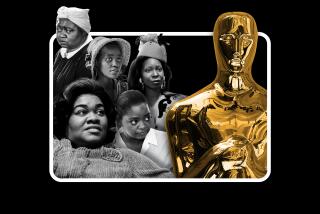Endangered Species: Strong Black Roles
- Share via
We already know that the black male is an endangered species in American society. As the troubling statistics released at the recent NAACP convention point out, one in four black men is incarcerated or on probation or parole; the murder rate for black males is 10 times that for white males; black males are the only demographic group in the United States that can expect to live shorter lives in 1990 than they did in 1980.
The black male is also an endangered species in Hollywood (“Few Blacks Ever Reach the Studio Front Office,” by David J. Fox, July 10).
The reason is that the people who make programming decisions, and who produce and write programming, are a very small group. It’s a select club of people. And it hasn’t been opened up to ethnic diversity as much as it should be. These people write from their experiences, or what they know about, and they don’t write things that they might be uncomfortable with or are indifferent to.
Throughout film, television and video, the black male is shown to be, by my definition, non-threatening. Even though he may be a villain, the villain knows that the power is arrayed against him, and he will be brought to justice or killed. If he is a comedian, even though he may have power, he is basically still in a comedy role in terms of exercising that power. If he is a buddy or a sidekick, he may also be in a position to threaten whites, but only as a buddy, sanctioned by his white counterpart, not as an individual avenger.
In most cases where the black has been cast as a primary dominant character in a threatening role, those shows have never survived television. You could say that the audience killed the programming. But I would argue that this type of programming is never given as much of an opportunity to succeed as other programs.
Cop shows, for example, have been a television staple for a very long time, and many white cop shows or shows where whites are law-enforcement officials have been tried and failed and brought back again and again until they succeed. This does not happen with black shows. They don’t get the number of times at bat and they also don’t get the better time slots (“TV’s Shame: Lack of Dramas on Black Life,” by Rick Du Brow, June 6).
The impact on real-life society is tragic. Because blacks are the largest users of TV and heavy users of film and video programs, this paucity reinforces the lack of dominant or positive black male role models. So what you have is young black kids going to movies and seeing no blacks in leadership roles. The consequence is that blacks seem to not have any kind of direct guidance for male roles other than what they get from television, and in most cases the black male is either weak--as a comedian--or he is put in a situation of being a criminal, so he can be exterminated by the powerful authorities who happen to be white, or he is put in the position of a buddy, which means he is controlled and consequently non-threatening.
This can only be remedied by opening up to blacks the doors of the writing pool and the ranks of people who can “say yes” to what gets on screen.
We need more people who see the black male as an integral part of society. To do that, you have to have more blacks as an integral part of television production. If that’s not going to happen--for economic reasons or because you can’t change people’s attitudes--then I think blacks have to take over their own destinies, create their own images, and project those images to their own population.
There are blacks who control billion-dollar economies in cities and blacks who control the armed might of the U.S. government. Gen. Colin L. Powell is chairman of the Joint Chiefs of Staff, and William H. Gray III is House majority whip. There are black mayors such as Tom Bradley. Why aren’t we putting these people in powerful, dynamic roles in our films?
I don’t think you can lay at Hollywood’s feet all of the problems and ills plaguing black society. Hollywood is just a microcosm of the whole society. There’s racism in Hollywood just as there is racism in the shoe industry. But Hollywood should come under closer scrutiny, because it is a powerful purveyor of ideas and images. And in any society where images are projected against the body politic, there is an impact on attitudes.
Hollywood cannot escape the facts. Some may say that films are purely artistic endeavors with no meaning and no basis in reality. But the fact of the matter is that everything we do comes out of our experience, and everything in our experience affects attitudes.
In the United States today, I see racial separation increasing, not decreasing, and racial polarization increasing. I don’t think we’re advancing. At best we’re running in place, and at worst, we’re moving backward.
See letters to Counterpunch, F6.
More to Read
The complete guide to home viewing
Get Screen Gab for everything about the TV shows and streaming movies everyone’s talking about.
You may occasionally receive promotional content from the Los Angeles Times.






